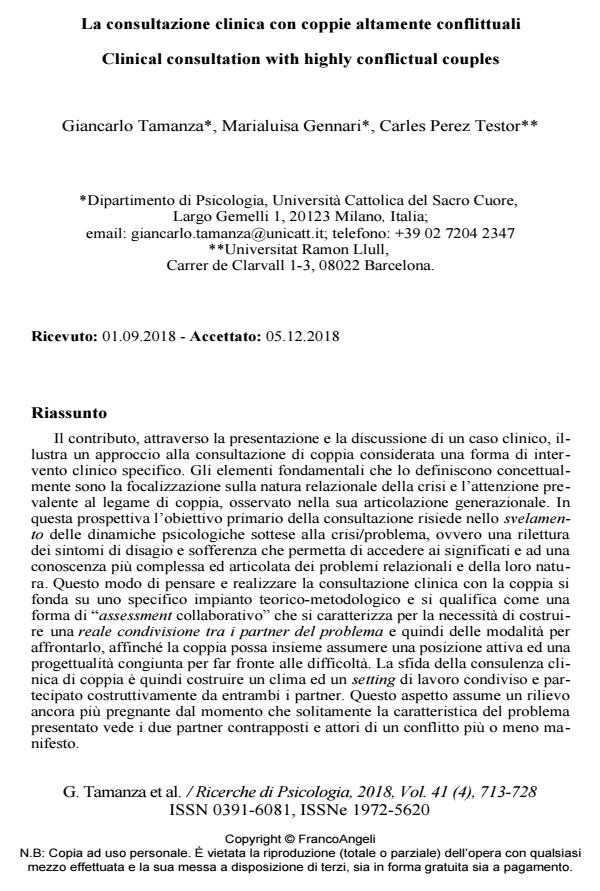Clinical consultation with highly conflictual couples
Journal title RICERCHE DI PSICOLOGIA
Author/s Giancarlo Tamanza, Marialuisa Gennari, Carles Perez Testor
Publishing Year 2019 Issue 2018/4
Language Italian Pages 16 P. 713-128 File size 200 KB
DOI 10.3280/RIP2018-004010
DOI is like a bar code for intellectual property: to have more infomation
click here
Below, you can see the article first page
If you want to buy this article in PDF format, you can do it, following the instructions to buy download credits

FrancoAngeli is member of Publishers International Linking Association, Inc (PILA), a not-for-profit association which run the CrossRef service enabling links to and from online scholarly content.
The contribution, through the presentation and discussion of a clinical case, il-lustrates an approach to the couple’s consultation considered a form of specific clinical intervention. The basic elements that define it conceptually are the focus on the relational nature of the crisis and the prevailing attention to the bond of the couple, observed in its generational articulation. In this perspective the prima-ry objective of the consultation lies in the unveiling of the psychological dynam-ics underlying the crisis / problem, ie a re-reading of the symptoms of distress and suffering that allows access to the meanings and to a more complex and articu-lated knowledge of the relationship problems and their nature.This way of think-ing and carrying out the clinical consultation with the couple is based on a specif-ic theoretical-methodological system and qualifies as a form of "collaborative assessment" that is characterized by the need to build a real sharing between the partners of the problem and therefore of the ways to deal with it, so that the cou-ple can together take an active position and a joint planning to cope with the dif-ficulties. The challenge of a couple’s clinical counseling is therefore to build a shared working environment, participated constructively by both partners. This aspect assumes an even more significance since usually the characteristic of the presented problem sees the two opposing partners and actors of a more or less manifest conflict.
Keywords: Couple consultation, collaborative assessment, relational diagnosis.
- The Clinical Generational Interview. An instrument for family assessment Giancarlo Tamanza, Marialuisa Gennari, in Frontiers in Psychology 1361028/2024
DOI: 10.3389/fpsyg.2024.1361028 - Assessing family relationships through drawing: the Family Life Space Marialuisa Gennari, Caterina F. Gozzoli, Giancarlo Tamanza, in Frontiers in Psychology 1347381/2024
DOI: 10.3389/fpsyg.2024.1347381
Giancarlo Tamanza, Marialuisa Gennari, Carles Perez Testor, La consultazione clinica con coppie altamente conflittuali in "RICERCHE DI PSICOLOGIA " 4/2018, pp 713-128, DOI: 10.3280/RIP2018-004010